The Lilith Blog
December 30, 2016 by Helene Meyers
Celebrating 7 Jewish “Nasty Women” of 2016
One of the many low points of this year occurred when Donald tried to diss Hillary by calling her a “nasty woman.” Yet feminists across the country immediately rebranded his intended insult: we knew that Donald’s “nasty woman” is one who talks back to bullies, who is competent and in command of facts, and who tweets for a better and more perfect union for all of us.
Jewish feminists in particular have lots of experience reclaiming the insults meant to silence us. In keeping with Lilith’s tradition of praising big-mouthed Jewish women, let’s celebrate seven of the Jewish “nasty women” who made news in 2016 (7 is the number associated with creation and blessing in Jewish tradition). May their collective work inspire us to each do our part to repair a very broken world.
- No Comments
December 29, 2016 by Susan Weidman Schneider
Eavesdrop on What They Said to Us
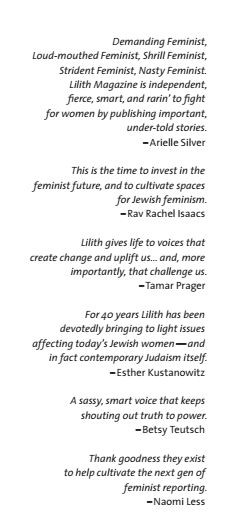 Dear Lilith Reader,
Dear Lilith Reader,
You know the feeling of whiplash. We do, too.
On the one hand, we’re delighted to open for readers like you a window on Jewish women’s lives you see nowhere else. The magazine’s perspective is feminist, its filter is Jewish, and you tell us again and again that Lilith’s award-winning content is unique and memorable.
On the other hand, this is no time to rest on these or any other laurels, dear reader.
The progress Lilith has helped spur in 40 years of fearless writing, and the changes the magazine has witnessed and helped bring about—both in Jewish life and the world at large — has got to keep on keeping on. A toxic blend of misogyny and anti-Semitism is on the rise. More than ever, we need to nurture the next generation of women to engage actively in feminist reporting and nuanced writing on the women’s issues — those human issues — that matter most to us.
Help Lilith continue to publish stories about everything from rabbinic sexual misconduct to radical Jewish women from the 1880s, from genderfluid teens to why Jews have a special stake in reproductive rights.
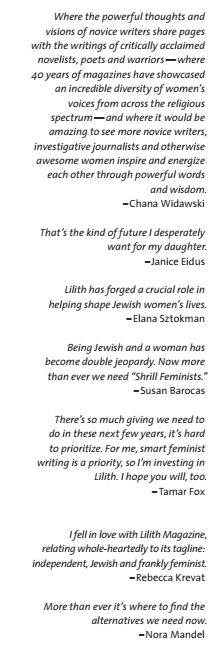 We appreciate the enthusiastic voices you’re hearing in this letter, from Lilith readers like you who state frankly: We Need More of This! More voices, more unusual perspectives, more good writing and thinking to help us all make sense of what’s coming next. Your support is needed now more than ever as women face dragons we couldn’t have predicted would again need confronting 40 years after Lilith’s launch.
We appreciate the enthusiastic voices you’re hearing in this letter, from Lilith readers like you who state frankly: We Need More of This! More voices, more unusual perspectives, more good writing and thinking to help us all make sense of what’s coming next. Your support is needed now more than ever as women face dragons we couldn’t have predicted would again need confronting 40 years after Lilith’s launch.
That’s why Lilith invites you to help fund a feminist future. I trust you will be part of insuring that future by contributing to Lilith today. Women like us—you and me—need Lilith’s inclusive, big-tent Judaism and feminism now more urgently than ever.
Your support will sustain Lilith’s work and women’s rights. Rights like respect for women’s aspirations and our bodies, access to safe and legal abortion care and the freedom to worship where and how we choose.
You’re hearing from a wide spectrum of women in this letter telling their friends online about Lilith and why they support this magazine’s crucial work. I hope you’ll do as they did, and give as generously as you can right now.
Because in addition to publishing the award-winning writing and cutting-edge thinking in the print magazine, Lilith is a matrix for emerging writers and thinkers on the Lilith blog, and face-to-face in intergenerational Lilith “salon” groups meeting around the world. Lilith has proudly crafted — some say invented — the banner of Jewish feminism. In Lilith, you see women’s issues through a Jewish lens and Jewish concerns through our unique feminist filter. Lilith inspires action and—importantly—empathetic understanding of lives like and unlike your own.
Your support helps make possible groundbreaking reporting, like these recent pieces:
The paradoxical experiences of a volunteer who returned to her father’s Vienna (from which he was expelled by the Nazis) to help feed and clothe its Syrian refugees.
Feminist therapists on what keeps Israeli women less fulfilled in bed, in a cover story on “Sex in the Promised Land.”
The challenges a lesbian couple face as they search out a welcoming Jewish school for their two sons; “we don’t want them to be tokens.”
Stepmothers! Throwing back the cape to reveal the misogyny behind the sinister stereo- type! Add to the mix religious differences, just to spice up the blended family.
“Why the Jewish Community Should Fund Fertility,” a poignant call for IVF and adoption support; this may be better for the Jews than sending students on free trips to Israel, argues the author.
How a Moroccan Jew merges her identities — and her words — in “Choosing Which Language to Live In.”
Read the first-hand struggle against the prejudices that a twenty-something Jewish woman who uses a scooter and an oxygen tank faces as she confronts barriers both social and physical in her Jewish world
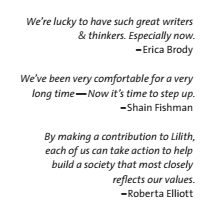 How will Lilith continue to nurture new voices as well as writers like these? The support you give now will help Lilith to discover, teach and nurture a new generation of trouble- makers, nasty women, strident women—all of them terrific writers and incisive reporters. And you’ll be able to read more of their work at Lilith in print and online.
How will Lilith continue to nurture new voices as well as writers like these? The support you give now will help Lilith to discover, teach and nurture a new generation of trouble- makers, nasty women, strident women—all of them terrific writers and incisive reporters. And you’ll be able to read more of their work at Lilith in print and online.
Many, many thanks for helping Lilith create a viable feminist future.
Susan Weidman Schneider
P.S. Please give generously now, so that Lilith can recruit the next generation of iconoclasts.
- No Comments
December 29, 2016 by Danica Davidson
The Surprising Jewish Roots of Barbie
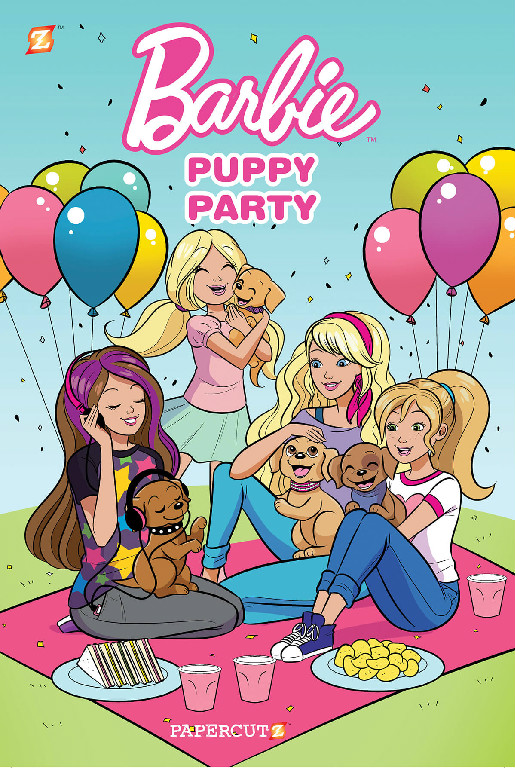 I originally knew Barbie as a doll, a franchise, an iconic figure in many childhoods, and a career woman who wore many hats, both literally and figuratively. It wasn’t until I was tapped by the kids’ comics publisher Papercutz and Mattel to write a Barbie graphic novel that I learned about her Jewish beginnings.
I originally knew Barbie as a doll, a franchise, an iconic figure in many childhoods, and a career woman who wore many hats, both literally and figuratively. It wasn’t until I was tapped by the kids’ comics publisher Papercutz and Mattel to write a Barbie graphic novel that I learned about her Jewish beginnings.
Researching the history of the character while brainstorming, I found many lesser-known facts about her I could relate to. Barbie was originally created by Ruth Handler, a Jewish woman whose parents left Poland for America because of anti-Semitism, just as my family left the Pale of Settlement to escape from pogroms.
- No Comments
December 28, 2016 by Erika Dreifus
Rightful Places

Rightful Places
When, today, a woman’s right
to wear a prayer shawl
or read from the Torah
or blow a shofar at the Kotel
is actually the focus of a bill submitted to the Knesset,
who can be surprised
that Judith’s story
is excluded from the Tanakh?
For if Judith—
brave,
articulate,
smart,
powerful,
pious,
latter-day
Hanukkah heroine
Judith—
had been granted admission
to those holy pages,
how on earth,
all these centuries later,
could anyone possibly justify
denying her daughters
our own rightful place?
Erika Dreifus writes poetry and prose in New York. Visit her online at www.erikadreifus.com and follow her on Twitter @ErikaDreifus, where she comments on “matters bookish and/or Jewish.”
The views and opinions expressed in this article are the author’s own and do not necessarily reflect those of Lilith Magazine.
- 1 Comment
December 27, 2016 by Yona Zeldis McDonough
Across the Gender Lines: Writing Historical Fiction that Appeals to Boys and Girls
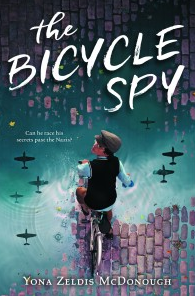 I’ve always thought of myself as a girly-girl writer. Although I’ve 10 biographies for kids that appeal to both boys and girls—many of them in the popular Who Was… series—my real love is girl-friendly stories; no fewer than five of my children’s books have the words doll or doll house in their titles. I’m also especially partial to stories involving Jewish girls, as the protagonists of The Doll With the Yellow Star, The Doll Shop Downstairs and The Cats in the Doll Shop will attest. If there was a problem here, I failed to see it and would have been happy to keep spinning my Jewish maidele stories as long as there were audiences for them.
I’ve always thought of myself as a girly-girl writer. Although I’ve 10 biographies for kids that appeal to both boys and girls—many of them in the popular Who Was… series—my real love is girl-friendly stories; no fewer than five of my children’s books have the words doll or doll house in their titles. I’m also especially partial to stories involving Jewish girls, as the protagonists of The Doll With the Yellow Star, The Doll Shop Downstairs and The Cats in the Doll Shop will attest. If there was a problem here, I failed to see it and would have been happy to keep spinning my Jewish maidele stories as long as there were audiences for them.
But a chance meeting with an editor from Boys’ Life produced the first crack in my frilly, feminine facade.
- No Comments
December 22, 2016 by Amelia Dornbush
Why Hanukkah Makes Me Sad
 Ever since I realized that I would be spending each day of Hanukkah with my parents this year, I’ve been trying to get excited about the holiday. As a family of three converts (who all converted at different times for different reasons… it’s a long story), this is the first time that all of us will have been together as Jews celebrating the holiday for its duration. And yet, I’ve been having a difficult time working up the same kind of enthusiasm as when we’ve been able to spend the High Holidays or Passover together.
Ever since I realized that I would be spending each day of Hanukkah with my parents this year, I’ve been trying to get excited about the holiday. As a family of three converts (who all converted at different times for different reasons… it’s a long story), this is the first time that all of us will have been together as Jews celebrating the holiday for its duration. And yet, I’ve been having a difficult time working up the same kind of enthusiasm as when we’ve been able to spend the High Holidays or Passover together.
I can’t shake the sense that it all feels artificial in a way, a manufactured celebration.
- No Comments
December 21, 2016 by Jenn Pollan
The Misogyny of the MatzoBall
CW: Please note that this post contains references to sexual assault.
The first time I realized that my body was, literally, up for grabs I was 18. It was September of my freshman year of college, and I was attending Wesleyan’s infamous Sex Party. The Sex Party felt oddly like a high school dance, but with harder drugs, women in lingerie, and even less concern for anything bordering on consent. I was tipsy, and anxious, still adjusting to my month-long foray into adult living. I remember my friend motioning to me to walk outside onto the large back porch, when all of a sudden there was a man standing in front of me with a crew cut, squeezing my breasts. What alarmed me most about this moment was the look in his eyes—calm, casual, matter of fact, as if he were merely picking up something he had dropped, something that had always belonged to him. Moments later, he was gone. He never spoke to me, and I never saw him again—a fact that always surprised me, given that we would spend four years living on the same tiny college campus.
Seven years later, I remain haunted by that moment and by the extent to which my body will never totally belong to me.
- 1 Comment
December 20, 2016 by Chanel Dubofsky
New Study Shows Abortion Has No Negative Impact on Mental Health
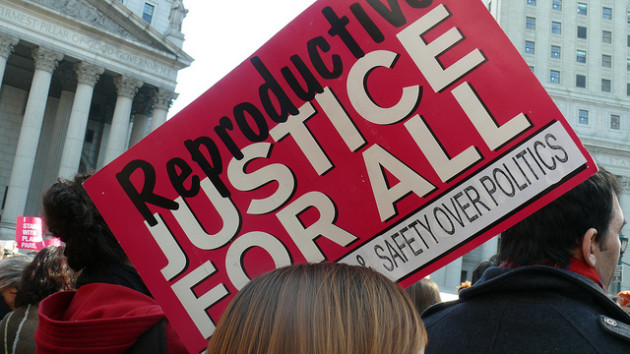
Photo by Charlotte Cooper
In 1988, then President Ronald Reagan charged Surgeon General C. Everett Koop with the task of creating a report declaring a link between abortions and decreased mental health quality. Koop didn’t deliver on the study; instead, in 1989, he sent Reagan a letter which stated that “the available scientific evidence about the psychological sequelae of abortion simply cannot support either the preconceived notions of those pro-life or those pro-choice.” Koop recommended that in order to assess the actual effects of abortion on women’s mental health, a long and comprehensive study needed to be conducted.
The notion that having an abortion will destroy you emotionally didn’t begin with the Reagan administration, and it didn’t end with Koop’s assertion that there was not enough data to prove it. Anti-choice folks claim the existence of “Post Abortion Traumatic Stress Syndrome,” indicated by guilt, anxiety, avoidance of children and pregnant women, numbness, depression, suicide, etc, after having an abortion. Although neither the American Psychological Association nor the American Psychiatric Association has acknowledged Post Abortion Syndrome as being real, that hasn’t stopped the anti-choice movement from perpetuating the myth of it, particularly in crisis pregnancy centers.
- No Comments
December 19, 2016 by Amy Stone
We Were Really Jewish. And Had a Christmas Tree.
 It’s been more than 65 years, but through the mists of time. I remember its smell of evergreen as if it were yesterday.
It’s been more than 65 years, but through the mists of time. I remember its smell of evergreen as if it were yesterday.
Our apartment living room on Manhattan’s Upper West Side. A tiny blue wooden table where, to the joy of my tiny brother and me, my mother had placed a tiny Christmas tree.
Eventually we moved to the suburbs, where we had a bigger Christmas tree with presents underneath.
- 1 Comment
December 16, 2016 by Rachel Isaacs
The Benediction I Gave for the White House Hanukkah Party
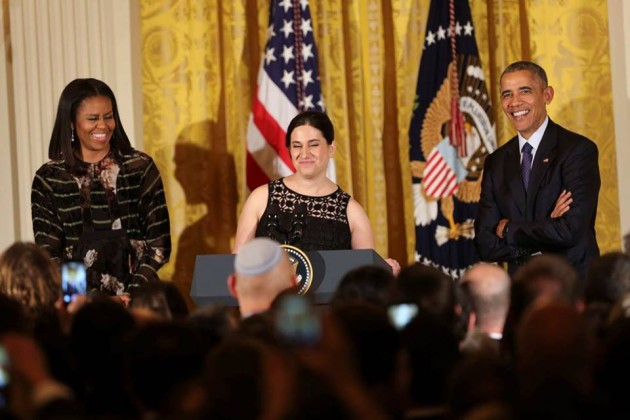 Thank you, Mr. President, Mrs. Obama. It is such an honor to be here today to teach, bless, and represent Waterville, Maine in the White House. Adam HaRishon, the first human, stood, shivering in the dark, frigid expanse. The days were becoming shorter, dimmer, colder in a way he had never experienced before, and he wondered: Is this what the world will always be? Our rabbis teach us that Adam prayed for eight days, and when the winter solstice passed, the days became longer, lighter, and warmer once again. Hanukkah is a festival that teaches us that it is always darkest before the dawn, and it is not foolish or naive to hold onto hope.
Thank you, Mr. President, Mrs. Obama. It is such an honor to be here today to teach, bless, and represent Waterville, Maine in the White House. Adam HaRishon, the first human, stood, shivering in the dark, frigid expanse. The days were becoming shorter, dimmer, colder in a way he had never experienced before, and he wondered: Is this what the world will always be? Our rabbis teach us that Adam prayed for eight days, and when the winter solstice passed, the days became longer, lighter, and warmer once again. Hanukkah is a festival that teaches us that it is always darkest before the dawn, and it is not foolish or naive to hold onto hope.
Of course, because Hanukkah is a Jewish holiday, we do not agree on a singular reason for why we celebrate. Hanukkah also teaches us about the necessity of rebellion. The Maccabees refused to accept tyranny, and were willing to sacrifice everything in order to retain their integrity as faithful Jews. They knew the injustice of dictatorship, and the danger of one human sovereign undermining the primacy our laws. As Jews, our faith is rooted in a legal system based on the foundational belief that all human beings are created equal, and created equally in the Divine Image.
We know the values and example we inherited from the Maccabees are not so different from the legacy we inherited from the mothers and fathers of the American Revolution, who fought for religious freedom, and to achieve the promise of a democratic republic free from tyranny.
In their honor, at this moment, let us engage in the work of hanukkat hamedinah, and hannukat haezrachut, rededicating ourselves to our nation and to the challenges and privileges of citizenship. The battle for the soul of our nation will not be won with swords, or muskets, or verbal daggers. Because as Jews we know the spiritual is political and the political is spiritual. We will illuminate our country by widening our hearts, and establishing richly Jewish homes in all parts of our great nation, sharing the sparks of Torah with all Americans.
Chag Urim Sameach. Happy Hanukkah.
Rabbi Rachel Isaacs delivered this benediction at President Barack Obama’s final Hanukkah party.
- No Comments
 Please wait...
Please wait...